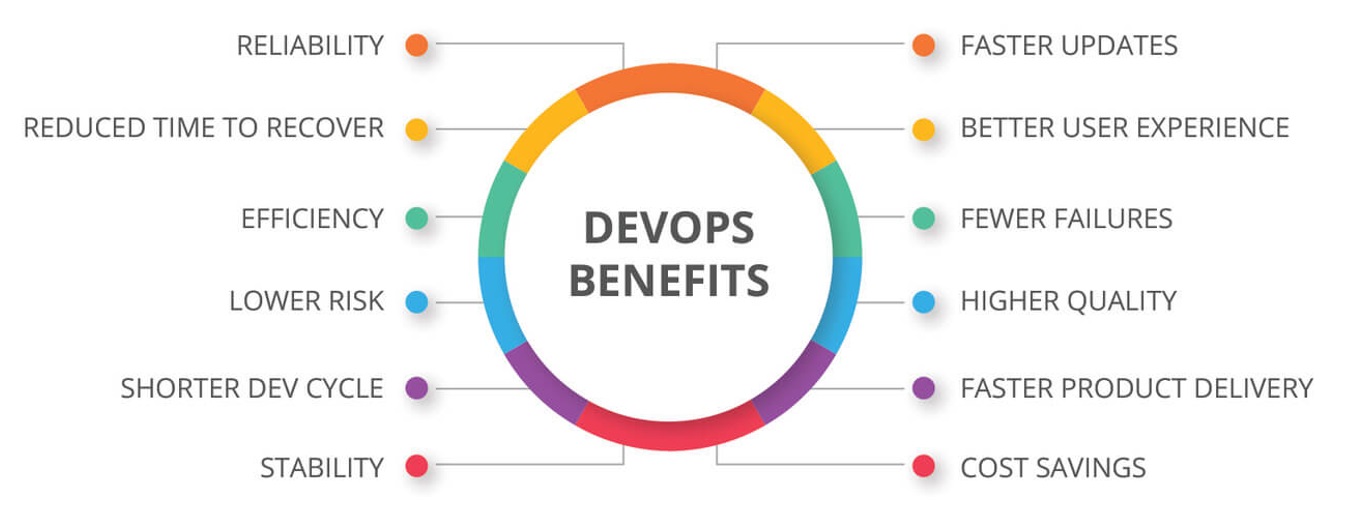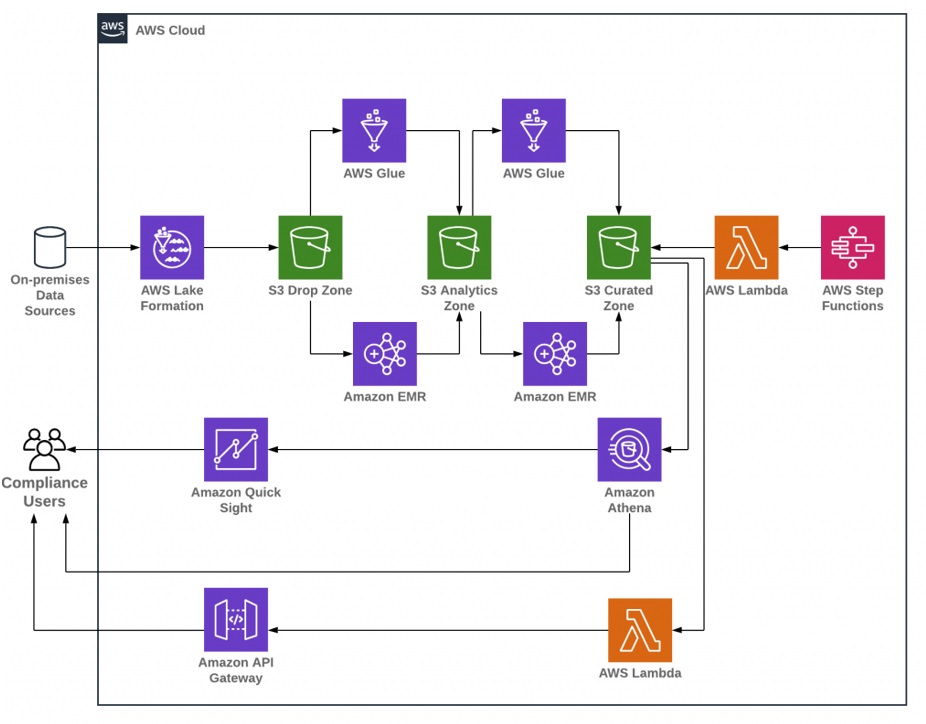In modern business, the success of IT products often depends on how quickly they emerge in the marketplace. This is driven by several factors – first and foremost, by the high level of competition and constantly growing consumer expectations. The faster an app is delivered to users, the earlier they start using it. The producer will be able to receive feedback, see shortcomings and vulnerabilities of their software, and then refine the product to make it the most efficient and interesting to clients, outperforming competitors. In this piece, let’s talk about how DevOps, combined with AWS cloud services, enables companies to bring their products to market faster and be the first to carve out promising niches, as well as about the advantages of this mix for business development.
The essence of the DevOps approach
DevOps professional services – and the DevOps (development & operations) approach in general – are based on a methodology that automates and integrates IT product development processes in order to ensure a faster go-to-market. This implies close interaction, in one way or another, between specialists involved in the product launch: programmers, testers/QA engineers, managers, etc. DevOps is applied not only during the development process but also at all further stages of the software development life cycle.
Advantages of DevOps
Higher speed of product development and launch
Research shows that applying the DevOps methodology speeds up product development and release by 2-10 times.
In the IT market, working at high speed means implementing new capabilities for clients more quickly, adapting to changing market conditions better, and achieving business goals more effectively. DevOps assists both development and operation teams with all this. For instance, microservices and continuous delivery give the opportunity to launch a product rapidly and then update it promptly.
DevOps provides a means to increase the frequency and speed of releases, making it possible to upgrade the product within a shorter period of time. Responsiveness to customer requests is also crucial to create a unique competitive edge. Continuous integration and continuous delivery (CI/CD) help in automating the software release process – from assembling to deploying.
Reliability
DevOps assists with app update quality control and infrastructure optimization, which allows businesses to build products rapidly and retain the loyalty of end clients. (CI/CD) methods help to test functionality and verify the security of each alteration. Monitoring and logging make it possible to track performance in real-time.
Simple scaling
DevOps methods facilitate the management of the processes of development and infrastructure maintenance and ensure their stable operation at any scale. Automation helps to effectively deal with complex changing systems and mitigate risks.
Optimized cooperation
DevOps implies the creation of effective teams where the core values are involvement, engagement, and common responsibility. Development and operation teams closely cooperate and share the majority of the responsibilities, integrating their work processes. This helps to avoid irrational actions and save time. For example, when DevOps is applied, it takes less time to transfer tasks from developers to operation engineers, and there is no need to write code bearing in mind the environment where this code is going to be run. DevOps contributes to making the software development process more transparent, which allows teams to collaborate effectively and increase their productivity.
Security
DevOps gives organizations the ability to grow rapidly while maintaining effective control and complying with all requirements. This methodology can be introduced – without losing security – using an automated compliance policy, fine setting, and configuration management practices.
Organizing work processes according to DevOps
Some organizations keep their own DevOps team. However, many businesses often turn to an expert in the area – a DevOps development company.
Building an in-house DevOps team is an overwhelming task for the majority of businesses, especially small firms and startups. And in this case, involving a third-party expert is an efficient decision.
Advantages of AWS cloud services for businesses
A report by Business Wire shows that 96% of organizations with a high level of DevOps leverage the cloud approach to development.
The events of 2020-2022 have changed the way business is done; however, even before these events, IT companies were searching for opportunities to transfer their core tools and processes to a more flexible environment and get a larger infrastructure capacity. A report by PwC shows that 75% of CFOs are considering turning to customizable, scalable cloud services. With cloud services, a business can instantly get access to computing capacities of any scale via virtual machines – let alone an extensive range of tools for such tasks as data analytics and storage.
Below are the main benefits that businesses gain by using AWS:
Cost reduction
Cloud services offer the opportunity to cut costs for purchasing equipment and specialized software, configuring and maintaining them, and so on. However, it should be emphasized that AWS reduces costs provided that correct cloud migration is ensured and cost management automation is carried out.
High development and launch speed
If required, cloud services can provide separate independent tools. This means that even a wide range of computing resources can be allocated within a few minutes, and an organization can get access to AWS development with a couple of clicks.
Backup
Along with lower operational costs and an increased speed of work, such a benefit as backup deserves special attention. Rapid delivery is essential, but the consequences of a system failure and subsequent downtime can be catastrophic for the company. Therefore, automatic data backup and uptime guaranteed by a service-level agreement (SLA) are the benefits to consider when migrating to the cloud.
Global reach
Digital product owners can ensure a seamless experience for customers regardless of their location. For instance, if a company conducts research and development in the USA but wants to attract clients from Dubai, a content delivery network can help with this. Simply put, if you use AWS, you can deploy your apps in different countries and regions.
Scalability
The use of AWS allows businesses to scale quickly and easily. A good example is Instagram, which skyrocketed in 2010 – by the end of the first day, the app had been downloaded and launched by 25,000 people, and a week later, the number of users reached 100,000. The app was launched on one server, which led to the necessity to further connect new servers in a speedy fashion.
When working with a standard infrastructure, fast scaling is impossible – you have to order new equipment, wait for its delivery, and configure it. There are no such problems in the cloud – it grows together with your project.
How the mix of AWS and DevOps speeds up software delivery and cuts costs
Clouds are popular in the DevOps concept because they offer pre-configured development tools: databases, test environments, CI/CD solutions, and others. A software team doesn’t have to develop everything from scratch – specialists take ready-made tools, customize them, and then get down to work.
If software is migrated to AWS, core infrastructure becomes significantly upgraded with the help of innovative cloud services. DevOps techniques can be used to properly plan and implement cloud migration, as well as automate cost optimization management to avoid unreasonable expenses. Moreover, on-demand cloud scalability and a pay-as-you-go approach can significantly speed up and simplify the delivery and deployment of software while significantly reducing costs.
Benefits of AWS in tandem with DevOps
Enhanced performance
Introducing AWS together with incorporating DevOps principles and practices significantly improves performance, which is especially important for startups. Mature companies of any size, having introduced cloud computing and the DevOps approach, can also upgrade their existing core systems to improve performance.
Optimized costs
It’s all about saving money once again. Many companies report some uptick in their cloud expenses after migrating to AWS. DevOps can resolve this unpleasant issue by automating key parts of cloud service delivery and cloud cost optimization management.
Increased customer satisfaction
The combination of DevOps and AWS ensures improvements that free up more time for innovation development and continuous quality enhancement, which entails increased customer satisfaction.
Launch of new products without additional IT specialists
In order to launch a project on your infrastructure, you need to connect and configure equipment and then constantly maintain and administer the infrastructure. All this requires additional specialists.
With AWS, much of the administrative and infrastructure management work can be shifted to a cloud provider, and you can get by with a minimum number of full-time employees.
For example, Burger King faced the following challenge: the number of downloads of their app usually increased on the days of the planned discounts, and the chain’s IT team hardly could cope with this. It was necessary to ensure smooth operation, so the business decided to migrate its capacities to the cloud.
Since the company had no relevant experience, it was decided to turn to a cloud service provider, entrusting infrastructure management and work on app stability to them.
In this way, the chain managed to achieve the needed level of app stability even with significantly increasing loads and doubled their speed of taking orders.
These are the reasons why cloud services and DevOps are gaining momentum.
Takeaways
To sum up, we are listing the key benefits of using a combination of the DevOps methodology and AWS:
- Accelerated development and launch;
- An opportunity to save on equipment and staff;
- Simplicity of processes;
- A possibility to delegate functions to a cloud provider;
- Simple scaling;
- Innovation.
If the above benefits matter to your business, we recommend you to consider using cloud services and DevOps.


































































